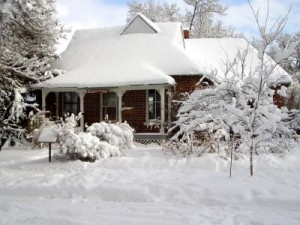Preparing Your Home for the Winter to Mitigate Home Damage & Insurance Costs
Every season brings its own set of challenges to the home owner wishing to safeguard their home and ensure that there is minimal, if not any, damage due to the weather. Keeping your home safe during the winter, especially in places where it snows heavily or the temperature drops to sub-zero levels, can be a challenge that requires you to take the proper precautions. In essence, you need to think ahead and then act accordingly.
Heating Related Dangers
The intense cold in the winter means that families use a variety of heating devices to keep themselves warm and comfortable. These include space heaters, wood fires, and boilers. Home owners should take reasonable care to ensure that these methods of heating do not lead to uncontrolled fires which can cause injuries or damage to property.
Heaters, Boilers
Prudent home owners should ensure that radiators, heaters, and boilers are functioning properly before the onset of winter. By checking the boiler, furnace, space heater, and other heating equipment or devices to ensure that they are working optimally and properly, the home owner can reduce fuel consumption and possibly prevent severe or any damage to property. For instance, having your space heaters cleaned and serviced can reduce the chances of a fire.
Water Pipes
Burst water pipes are another frequent cause of damage to homes in the winter. This can be prevented by keeping the home heated to at least 65 degrees Fahrenheit even if you are going to be away for a few days. This will prevent the water in the pipes from freezing and help protect the pipes. Moreover, insurance companies are more likely to reimburse the costs of repairing the damage caused by a burst pipe (if that were to occur) if the home was kept heated during the winter.
While most home owners’ insurance policies will cover damage caused by burst pipes and damaged boilers, the insurance company will cover a larger part of the costs incurred (whatever they are obligated to besides the deductible, if any) if the home owner can demonstrate that they took reasonable precaution to prevent this from happening in the first place. The insurance payout may also occur faster if they feel the owner has been responsible and sincere in their efforts and offers a proper explanation for the damage that has occurred. It just comes down to sincerity and trust.
Trim Trees
The prudent home owner should examine the trees around the house and trim dead branches and weakened trees, if any, before it begins to snow. This will ensure that the weight of the snow does not cause the branches, or the tree itself, to break and fall onto the house.
Check the Roof
Home owners should also check the roof for any wear and tear and any weak points before it begins to rain or snow heavily. This will help prevent limited or extensive indoor damage by helping to avoid any leaks. You can prevent damage to the walls and furniture and ensure that mold and mildew do not appear by taking the time to repair and/or maintain the roof before the onset of winter.
By thinking and planning ahead to safeguard your property for the winter, you will save more than just money. You will experience a peace of mind since your prized possessions, your loved ones, and your home itself will have a better chance of remaining undamaged even when the weather outside is harsh, stormy, and relentlessly cold.

